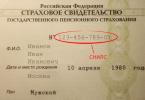This is one of those places where residents of the former USSR most willingly move. The quality of life is relatively high, there are many effective social guarantees and benefits related to work and living. Citizens of Russia and Ukraine do not even need a visa to come there, but it is not as easy as it sometimes seems at first glance. So how to organize the movement of people to Israel for permanent residence from Ukraine and Russia?
Not everyone who wishes to receive official permission from the authorities to live in this state is by no means. There are several categories of people who, under the laws of this power, can acquire a residence permit fairly quickly.
- Jews and people who have Jews in their family;
- those who want to work in this territory;
- those who are married to a person from this country;
- representatives of the older generation with children permanently residing in this territory.
For the first category of people, a law was even signed that stipulates such a phenomenon as repatriation, as well as which people can be considered Jewish. It came into force after World War II and is still in use today.

Many use the law on repatriation
For those wishing to work for the benefit of the state, the right to permanent residence is also provided, but before applying for it, you must obtain a work visa. In order for a visa to be opened, a sanction is required, for which you need to apply to the Ministry of Internal Affairs, where you plan to live. It gives the right to stay and work for 365 days on the Sacred Land. However, it has the ability to be extended if necessary, and it can be extended for an indefinite time - if the employment relationship is confirmed by a signed contract. In this case, the employer acts as a guarantor. Work is one of the most common methods for moving to Israel.

In addition, you can immigrate to Israel by marrying a citizen of this state or by marrying its citizen. The method is also very common, although with its help you can get the opportunity to stay for only one calendar year, but it can be extended at the end of it. The marriage itself can be concluded on the territory of any state, it does not have to be the homeland of the Jewish spouse.

Older people who have retired can also move to this country. It is enough to have an adult child who is legally there, or to be married to a citizen or citizen of this power. At first, people from this category can count on a B1 visa. Then they can become holders of a temporary certificate. And only then - to apply for the issuance of the right to permanent residence. The application must have attached papers confirming the fact of kinship, a foreign passport, as well as a certificate of no criminal record in the territory of the native state.
Repatriation
Every person who has Jewish roots can move to Israel for permanent residence. However, first you need to prove your involvement in the Jewish nation.
It is quite easy to do this, the requirements are simple:
- it is necessary to have a mother with Jewish origin;
- must practice Judaism.

Adoption of Judaism is a necessary condition for repatriation
In addition, if the mother is not a full-blooded Jew, it is enough to have a Jewish father or be the grandson of a person of this nationality. Those who are married to Jews also fall under the law.
As soon as a person, in accordance with the specified law, is recognized as a repatriate, he will be gladly accepted in Sokhnut, a specialized organization that provides assistance in:
- organization of moving to this country - purchase of air tickets and transportation of necessary personal belongings and property;
- registration of all kinds of papers when the repatriates arrived in the power of destination;
- registration of all papers that are required for immigration;
- assistance with employment for displaced persons. This takes into account which profession was practiced at home, as well as what education was received.
A repatriate who applied to the Sokhnut does not pay for all the listed services rendered to him. The organization itself assumes all payment of all expenses. The organization can also help with deciding where to live upon arrival. Reviews about her activities are always only positive.
Making a request
As in the case with any other power, leaving for Israel is always a lot of paperwork. Without this, moving to Israel for permanent residence from Russia or Ukraine is impossible.
First of all, you should come to the embassy of the state where you plan to leave, where the person who wishes to obtain citizenship lives. The embassy deals with the relocation to the Holy Land of those who are recognized or have every reason to be recognized as repatriates, as well as those who have children living there. The embassy also helps those who have married a person of Jewish nationality in moving.
When a permanent residence permit is required, those who are employed in the territory of the state should go directly to the Ministry of the Interior.
The audience at the embassy always took place in two stages:
- submission of the necessary documentation;
- interview with the consul.
It is better to find out in advance from those who already have such experience how it is better to pass an interview. It is important to remember that only Jews live in the territory of this power, and indicating another religion at the interview is fraught with a refusal of a residence permit.
However, we must not forget that in order to submit papers, you must first make an appointment in advance and come strictly on the appointed day. If more than one person moves, each of them must be at the reception of the consul, including minor children, even if they are less than three years old.
Both a Jew and a non-Jew, in order to enter the Holy Land with a residence permit, need to issue a special document authorizing residence abroad. In various powers that came from the USSR, this document may be called and looked differently. So, those living in Russia or Ukraine must have a foreign passport, where the corresponding stamp will be placed, and those living in Belarus must issue a new passport for this stamp.

The specified stamp is affixed to the Ministry of Internal Affairs of the country from which the departure takes place. However, it happens that a stamp is necessary for those who are already actually in the territory of their new homeland. There is only one way out of this situation: an appeal to the Israeli Ministry of Internal Affairs with a corresponding statement and a request for a change in status. This service then checks all submitted documents and, if they are in order, gives the applicant a permit that is valid for one calendar year. Then you can renew your B1 visa. If it is necessary to obtain the right to permanent residence, verification will be required, which is carried out by the Liaison Bureau of the Ministry of Foreign Affairs. Only after that can an A5 visa be issued, which should also be renewed annually.
Documents for emigration
The path of emigrants to the Holy Land is not so simple - a large number of documents are required. Even those who have been granted the status of a repatriate are checked very carefully before being granted a residence permit.
Documents that must be provided at the consulate include:
- passport (Russian, Ukrainian, Belarusian, etc.);
- a passport with a validity period ending at least half a year after the visa documents were issued;
- birth certificates of each person moving (including children);
- documents confirming social factors: marriage or divorce certificate, death certificates for close relatives (if you need to prove nationality);
- photo as for a passport;
- a completed application form required for the issuance of visas;
- a certificate that refutes the presence of a criminal record at home;
- information about the biography and place of residence of Jewish relatives (data on the last three generations).
However, simply collecting all the certificates is not enough, it is important that they are not only in Russian (Ukrainian, Belarusian), but also in Hebrew and English. They must be notarized. Not only copies, but also originals of all of the above must be submitted to the embassy.
It is also important that, when emigrating, Russia will not need it either. Therefore, it is possible to become the owner of dual citizenship and freely cross the border of two states. Emigrants receive the same rights and social guarantees as citizens of the country, and repatriates receive special social support during the first year after entry.
If you find an error, please highlight a piece of text and click Ctrl+Enter.




